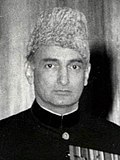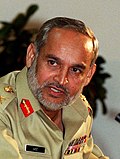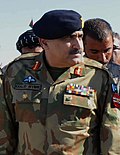| # | Portrait | Name | Start of term | End of term | Unit of Commission |
|---|
| 1 | | Major General Reginald Antony Hutton | 1947 | 1951 | 2nd Gurkha Rifles [3] |
| 2 | | Major General Akbar Khan
DSO | 1951 | 1951 | 6/13 Frontier Force Rifles (1 FF) |
| 3 | | Major General Mohammad Yusuf Khan | 26 March 1951 [4] | 1953 | |
| 4 |  | Major General Mian Hayaud Din
HJ MBE MC | 1953 | 1955 | 4/12 Frontier Force Regiment (6FF) |
| 5 |  | Major General Sher Ali Khan Pataudi
HJ | 1955 | December 1956 | 7th Light Cavalry |
| 6 |  | Major General Habibullah Khan Khattak
SPk LOM | 24 January 1957 [5] | July 1957 | 12 Baluch Regiment |
| 7 | | Major General Yahya Khan | 25 July 1957 [6] | 23 December 1962 | 3rd Battalion (Queen Mary's Own, 10th Baluch Regiment (10 Baluch) |
| 8 | | Major General Malik Sher Bahadur | 24 December 1962 [7] | 1966 | 4th Battalion (Duke of Connaught's Own) The Baluch Regiment (11 Baluch) |
| 9 |  | Major General Sahabzada Yaqub Khan
SPk | 1966 | 19 December 1968 | 18th King Edward's Own Cavalry |
| 10 |  | Major General Gul Hassan Khan
SQA SPk | 20 December 1968 [8] | 19 December 1971 | 5th Horse (Probyn's Horse) |
| 11 | | Major General M. Rahim Khan | 1972 | 1974 | |
| 12 | | Major General Iqbal Khan
NI(M) SI(M) SBt | July 1974 | March 1976 | 5th Battalion (Queen Victoria's Own Corps of Guides) 12 Frontier Force Regiment (2 FF) |
| 13 | | Major General Abdullah Malik | March 1976 | March 1978 | |
| 14 | | Major General F. S. Lodhi | March 1978 | June 1980 | East Bengal Regiment |
| 15 | | Major General Mirza Aslam Beg
NI(M) SI(M) SBt | June 1980 | October 1985 | 16 Baloch Regiment |
| 16 | | Lieutenant General Muhammad Safdar | October 1987 | January 1988 | Punjab Regiment |
| 17 | | Lieutenant General Mian Muhammad Afzaal
HI(M) SI(M) SBt | January 1988 | August 1988 | 6 Lancers |
| 18 |  | Lieutenant General Shamim Alam Khan , NI(M) SBt SJ | May 1989 | April 1991 | 20 Lancers |
| 19 |  | Lieutenant General Asif Nawaz Janjua
NI(M) HI(M) SBt | April 1991 | August 1991 | 5 Punjab Regiment |
| 20 |  | Lieutenant General Farrakh Khan | August 1991 | July 1994 | 15th Lancers |
| 21 |  | Lieutenant General Jehangir Karamat
NI(M) SBt | July 1994 | January 1996 | 13 Lancers |
| 22 | | Lieutenant General Iftikhar Ali Khan
HI(M) SBt | January 1996 | May 1997 | 11 Baluch Regiment |
| 23 | | Lieutenant General Ali Kuli Khan Khattak
HI(M) | May 1997 | October 1998 | 12 Baloch Regiment |
| 24 |  | Lieutenant General Muhammad Aziz Khan
NI(M) HI(M) SBt TBt | October 1998 | August 2000 | 12 Punjab Regiment |
| 25 | | Lieutenant General Muhammad Yusaf Khan | August 2000 | October 2001 | The Guides Cavalry (Frontier Force) |
| 26 |  | Lieutenant General Shahid Aziz | October 2001 | December 2003 | 10th Baloch Regiment |
| 27 | | Lieutenant General Tariq Majid
NI(M) | December 2003 | October 2006 | 28 Baloch Regiment |
| 28 | | Lieutenant General Salahuddin Satti | October 2006 | October 2008 | 40 Punjab Regiment |
| 29 | | Lieutenant General Muhammad Mustafa Khan | October 2008 | April 2010 | |
| 30 |  | Lieutenant General Khalid Shameem Wynne
NI(M) HI(M) | April 2010 | October 2010 | 20 Punjab Regiment |
| 31 | | Lieutenant General Waheed Arshad
HI(M) TBt | October 2010 | January 2013 | 16 Horse |
| 32 | | Lieutenant General Rashad Mahmood
NI(M) HI(M) | January 2013 | November 2013 | 7 Baluch Regiment |
| 33 | | Lieutenant General Ishfaq Nadeem Ahmad
HI(M) | November 2013 | April 2015 | 34 Azad Kashmir Regiment |
| 34 |  | Lieutenant General Zubair Mahmood Hayat
NI(M) | April 2015 | November 2016 | 3 (Self Propelled) Medium Regiment Artillery |
| 35 | | Lieutenant General Bilal Akbar | December 2016 | August 2018 | Corps of Artillery |
| 36 |  | Lieutenant General Nadeem Raza
NI(M) HI(M) | August 2018 | November 2019 | 10 Sind Regiment |
| 37 |  | Lieutenant General Sahir Shamshad Mirza | November 2019 | September 2021 | 8 Sind Regiment |
| 38 | | Lieutenant General Azhar Abbas | 8 September 2021 | December 2022 | 41 Baluch Regiment |
| 39 | | Lieutenant General Muhammad Saeed | December 2022 | 25 November 2023 | 10 Sind Regiment |
| 40 |  | Lieutenant General Avais Dastgir | 25 November 2023 | 24 January 2025 | 58 Cavalry |
| 41 | | Lieutenant General Syed Aamer Raza | 24 January 2025 | Incumbent | 6 Lancers |

















